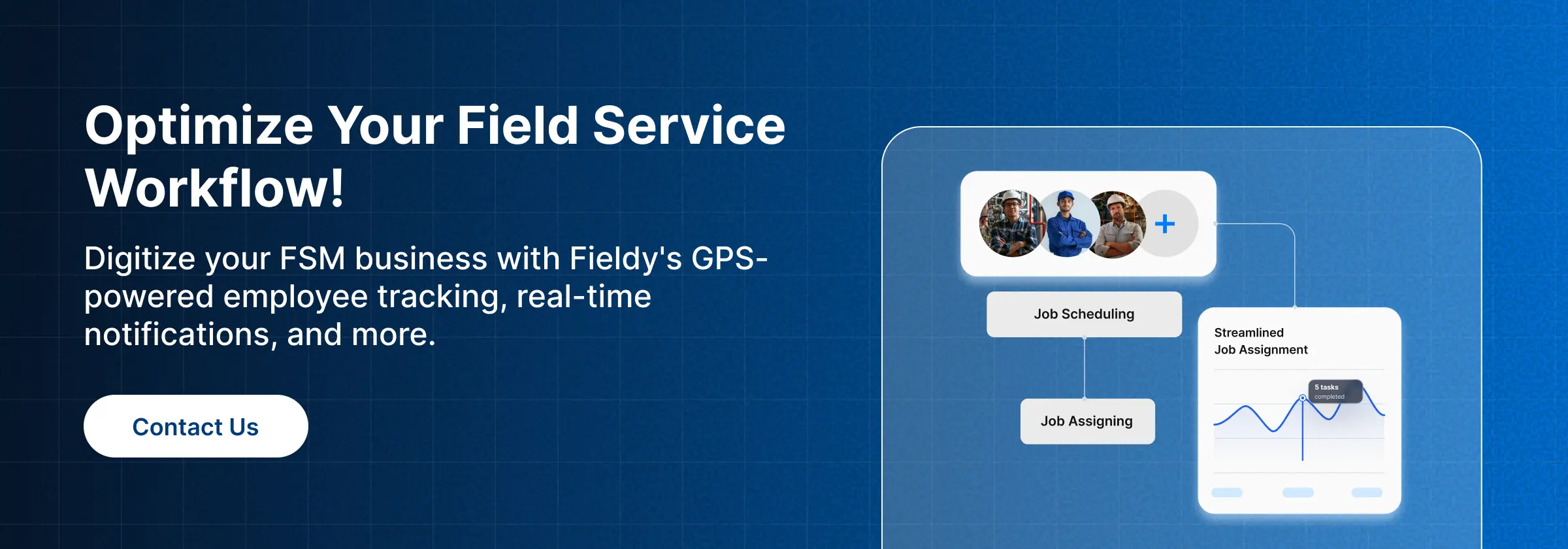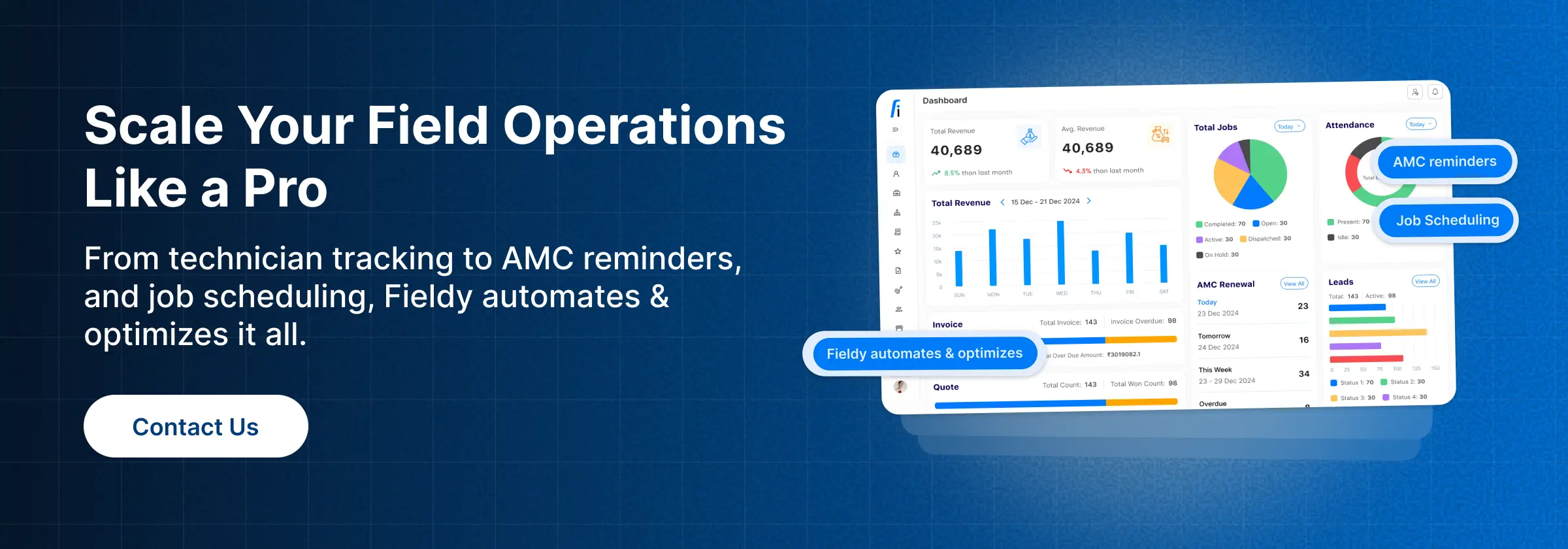👋 Introduction
A customer lead is the primary step towards achieving a fruitful customer relationship. Inquiries from prospective clients need to be more efficiently managed, especially in the speedy modern service sector. There is an urgent need to nurture and cultivate leads, and transform them into real customers, ahead of the competition.
Every potential customer must be taken care of during their purchasing journey, which is taken care of by a process called lead management.
Lead management is essential for the proper functioning and growth of businesses related to HVAC, plumbing, electrical, and pest control services. The absence of proper lead management services means losing arrangements for proper services and slow responses, which in turn means the steady flow of business gets affected. As the response gets slower, the chances of a competitor snatching it away get higher.
The issue above is resolved by Fieldy’s lead management software. By centralizing all inquiries, it reduces the risk of missed or delayed opportunities. Service companies can respond to leads faster, assign the appropriate technician or sales representative immediately, and monitor every lead until conversion. The software also reduces reliance on manual processes, allowing teams to process more leads with less staff while enhancing precision. Ultimately, it streamlines processes and improves conversion rates and customer satisfaction.
❓ What is Lead Management in Field Service?
At the most basic level, lead management in field service entails receiving inquiries, assessing and addressing them, monitoring their status, and ultimately securing appointments. However, field service has its own set of challenges:
- Searching for emergency local services: A person needing an emergency plumber will probably phone the first few that pick up promptly.
- A prompt reply is required: The Harvard Business Review indicates that responding to leads within 5 minutes of receiving them increases the chances of converting the leads by 9 times.
- Numerous lead-generating channels: without a unified system, it’s very easy to misplace leads coming in from calls, websites, social media, referrals, and even walk-ins.
This is why Fieldy’s Field Service Management Software centralizes lead data, ensuring no inquiry slips through the cracks and every potential job gets the attention it deserves.
⏩ Why Speed and Structure Matter (Quick Industry Insight + Stats)
Leads decay fast: a landmark study of 1.25 million online sales leads found that firms contacting a lead within an hour were nearly seven times more likely to qualify that lead than firms that waited longer and the advantage jumped dramatically at five minutes. Fast follow-up is not optional; it’s a competitive moat.
Practical takeaway: set SLAs for response (ideally minutes, not hours), capture source data automatically, and route instantly to an owner. Automation and smart scheduling aren’t just efficiency plays, McKinsey research shows smart scheduling and optimization can increase field productivity materially (studies report productivity uplifts in the 20–30% range and large drops in job delays).
💡 Key Stages of Lead Management in Field Service
Effective lead management isn’t just about answering phone calls, it’s about having a structured process in place. Let’s break it down into five stages:
Stage1️⃣: Lead Capture
Leads arrive from multiple touchpoints, websites, ads, calls, referrals, and even social media. Without an organized system, these inquiries can easily scatter across different platforms.
- Example: An HVAC business might get leads from seasonal ads on Facebook, phone calls for emergency repairs, and referral requests from satisfied customers.
- With Fieldy, all these leads are auto-captured in one platform, eliminating the chaos of sticky notes, emails, and spreadsheets.
Stage2️⃣: Lead Tracking & Organization
Once captured, leads must be organized and routed to the right person.
- Managers can use tags, priority levels, and categories to classify leads.
- Example: An urgent “no heat” service request during winter should be flagged as high priority and immediately assigned to the nearest available technician.
Field service dispatch software makes this effortless, ensuring no urgent job gets buried under routine inquiries.
Stage3️⃣: Lead Qualification
Not every lead is worth pursuing. Businesses need to filter out prospects based on budget, urgency, and job fit.
- Example: A small pest control business may qualify leads based on whether the customer needs one-time removal or a recurring contract.
- Industry Insight: According to Salesforce, 67% of lost sales happen because leads aren’t properly qualified or prioritized.
With Fieldy’s smart filters, service managers can focus on high-value leads first, improving efficiency and conversion rates.
Stage4️⃣: Lead Nurturing
Many potential customers aren’t ready to book immediately. They need reminders, follow-ups, and personalized communication to build trust.
- Example: A pest control business might nurture leads by sending seasonal service reminders (e.g., termite inspection before monsoon).
- Example: An HVAC company could schedule an annual maintenance reminder for customers who inquired months ago.
Fieldy automates this nurturing process with reminders, follow-ups, and scheduled notifications, so no opportunity is forgotten. When combined with Field service AMC management software, it ensures that recurring contracts and service agreements are also managed efficiently, helping businesses stay on top of both new leads and long-term customer commitments.
Stage5️⃣: Lead Conversion
The final goal of lead management is turning inquiries into booked jobs.
- Fieldy integrates directly with job scheduling software, so once a lead is ready, it converts instantly into a work order.
- Example: A plumbing business can convert a customer inquiry into a scheduled repair job in seconds, without re-entering data manually.
This seamless conversion flow reduces delays, boosts customer satisfaction, and helps businesses win jobs faster than competitors.
🎯 Benefits of Lead Management in Field Service
A strong lead management system boosts revenue, efficiency, and customer satisfaction.
1.⏱️ Improved Response Times:
Speed is critical in field service. When an AC fails in summer, the first company to respond usually wins. Centralized lead management routes inquiries instantly, enabling up to 60% faster lead-to-job cycles.
2.📈 Higher Conversion Rates
Leads often slip through cracks without tracking. Centralized systems with timely follow-ups reduce lost opportunities. Businesses using automated lead management see 20–30% higher conversion rates.
3.📊 Better Resource Allocation
Assigning the right lead to the right rep improves efficiency. Urgent jobs can go to nearby technicians, while maintenance contracts go to senior staff, reducing waste and improving productivity.
4.🤝 Enhanced Customer Experience
Customers expect speed and transparency. Automated reminders and consistent updates build trust. For instance, pest control firms using seasonal reminders see higher loyalty and repeat bookings.
5.💵 Revenue Growth
Effective lead management directly increases profitability. Higher conversion rates and retention accelerate growth. Industry data shows businesses with structured lead systems grow 1.5x faster than those using manual methods.
Industry Insight: Research by InsideSales shows that businesses with structured lead management processes see a 30% higher revenue impact compared to those without.
🛠️ How Fieldy’s Lead Management Software Makes a Difference
Fieldy isn’t just another CRM, it’s designed specifically for field service workflows.
- Centralized Lead Dashboard: One place for all inquiries.
- Automated Assignment: Instantly routes lead to the right rep or technician.
- Reminders & Follow-Ups: No more missed opportunities.
- Conversion Tracking: Monitors the entire journey from inquiry → job booked → revenue closed.
🌍 Real-World Example
A mid-sized HVAC company integrated its website leads, inbound calls and referral forms into a single lead dashboard, instituted a “5-minute acknowledgement” SLA via automated SMS, and used priority scoring for emergency repair requests.
Within six months they reported: an approximate 2× improvement in lead-to-job conversion and measurable reductions in scheduling gaps. (Company anonymized; example reflects common FSM adoption results.)
🏆 Best Practices for Lead Management in Field Service
To truly understand what lead management is in field service and how it impacts revenue, businesses must adopt practical strategies that prevent lead loss and accelerate conversions. Here’s how to maximize results:
1.⏳ Respond Within Minutes, Not Hours
Speed remains the #1 conversion driver. Research shows that leads contacted within 5 minutes are 9x more likely to convert than those contacted after an hour. Setting up instant alerts ensures no inquiry goes cold.
2.🧐 Qualify Leads Effectively
Not all leads are created equal. Asking upfront about budget, urgency, and job type helps identify high-value prospects. For example, an HVAC company can prioritize “no cooling” emergency calls over routine servicing.
3.🤖 Leverage Automation
Manual follow-ups often lead to missed opportunities. Automated reminders, SMS updates, and email workflows ensure prospects receive consistent communication without overwhelming staff.
4.📏 Track Key Metrics
Metrics like conversion rate, response time, and cost per lead give visibility into performance. A pest control business, for instance, can measure how seasonal ad campaigns drive leads and adjust accordingly.
5.🎯 Focus on ROI-Driving Channels
Not every channel produces quality leads. By tagging sources, businesses can double down on the platforms that generate the highest conversions, whether it’s Google Ads, referrals, or local partnerships.
📝 Conclusion
Lead management isn’t just about collecting inquiries, it’s the backbone of sustainable growth in field service. With rising competition and customer expectations, businesses that fail to organize, qualify, and nurture leads will continue to lose opportunities.
With Fieldy’s Lead Management Software, service businesses can capture, track, and convert leads seamlessly, all while improving customer satisfaction and driving long-term revenue.
Try Fieldy’s Lead Management Software today and turn more inquiries into lifelong customers.
❓ FAQs
What is lead management in field service?
A: Lead management is the process of capturing, qualifying, tracking, nurturing, and converting service inquiries into booked jobs. For industries like HVAC, plumbing, and pest control, it’s critical to prevent missed opportunities.
Why is lead management important for field service businesses?
A: Because field service is highly competitive. Studies show that businesses responding to inquiries within 5 minutes are far more likely to win the job over slower competitors.
What are the main stages of lead management?
A: The key stages are lead capture, tracking, qualification, nurturing, and conversion. Each stage ensures smoother hand-offs and higher conversion rates.
How does lead management software improve conversions?
A: Software like Fieldy centralizes inquiries, automates assignments, and sends reminders, ensuring no lead is lost and improving close rates significantly.
Can small field service businesses benefit from lead management?
A: Absolutely. Even a small plumbing or electrical service can grow revenue by tracking inquiries, qualifying high-value jobs, and using automation to follow up quickly.


![What is Lead Management in Field Service? Key Stages & Benefits [Master Guide 2026]](https://blog-admin.getfieldy.com/wp-content/uploads/2025/09/What-is-Lead-Management-in-FSM.webp)

